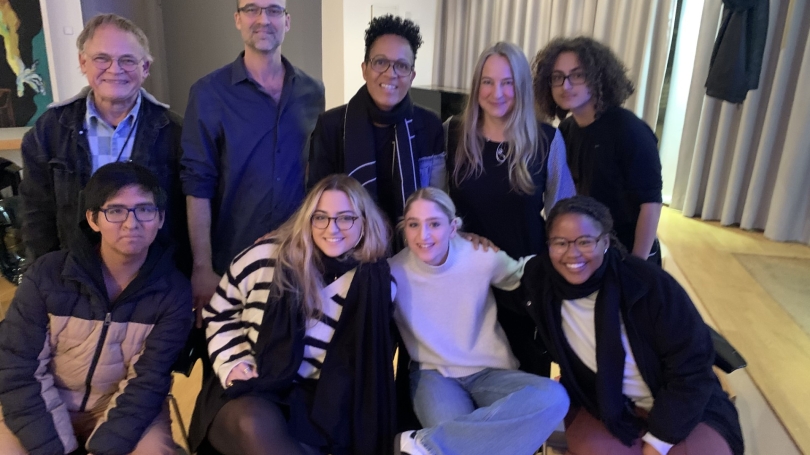
- Undergraduate
- Foreign Study
- Opportunities
- Inclusivity
- News & Events
- People
Back to Top Nav
Back to Top Nav
Back to Top Nav
The students and Faculty Director Heidi Denzel started their program with a City Bike Tour and were introduced to the classical highlights of Berlin, but also followed off-the-beaten paths to less touristy places.
After the orientation weekend, the students met their host families and were happy to find out that they would live in the nicest neighborhoods of Berlin.
They spent most of their class time outside to get to know the city but also invited guest speakers to their classes. In the context of Michael Saman's class German 10: LSA+ course, they invited the charismatic filmmaker, author, and activist Mo Asumang and discussed her films Roots Germania and The Aryans. Her brave interactions with a white-power band, who had delivered a death threat to her via a song, and her fearlessly inquisitive interviews with members of the KKK were as impressive as her kindness, humor, and warmth. Here (https://mo-lab.org/) you can read more about her wonderful NGO which teaches communication strategies for difficult dialogues between people who think differently.
Multiculturalism, postcolonialism, and identity were also issues in German 29: Contemporary Germany and Berlin, taught by Birga Meyer, the director of the Schwules Museum (gay museum at https://www.schwulesmuseum.de), the oldest museum in the world dedicated to gay history. The students were introduced to the world's second-largest archive, focusing on LGBTQ+ history and culture, and had the chance to interview several sex activists. In this class, the students also visited the contested Humboldt Forum and participated in a Fridays for Future demonstration for climate change.
In German 30: Studies in German History, they explored several facets of Germany's complex past and visited significant sites of the German Empire, Nazi rule, Cold War, and Re-Unification. Detlef Gericke's incredible network also allowed them to get tickets to already sold-out events of cultural icons like Wolf Biermann and Ekke Maß. Here, you can see them in front of the New Palace of Frederic the Great and two students performing their interpretation of the complex relationship between Frederic the Great and the French philosopher Voltaire.
Acting and the interpretation of theater plays were the focus of German 31: Studies in German Theater. Berlin has more than 150 stages that raise the curtain every night, and they were able to get tickets for nearly always sold-out classics like the Dreigroschenoper. Still, they were also impressed by the innovative performances of lesser-known theater groups. Their favorite experiences were certainly the theater workshops of the Berliner Ensemble and the Rambazamba Theater (https://rambazamba-theater.de/de), one of Europe's most renowned disability-inclusive stage houses, where they could see behind the scenes and learn strategies for better body and voice awareness from professional actors.
During their program, they also visited Hamburg, Leipzig, and Dresden.